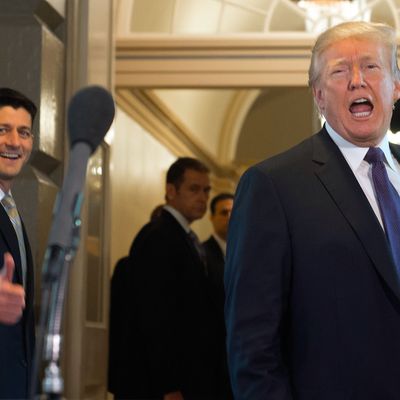
Until very recently — as in, yesterday — a plausible argument could be made that Donald Trump’s authoritarianism was entirely aspirational. However deeply he yearned to rule with an iron fist, he was too bumbling, too lazy, too distractible and childlike to actually carry out his plans. “We’ve learned over the last year that Trump is probably even more haphazard and incompetent than some of the people most fearful about his presidency believed, which makes it much more difficult for him to undermine the system,” argued Yascha Mounk, who has expressed alarm about the threat posed by Trump. Ross Douthat has made the same case previously.
The events of the last 24 hours made the case for complacency look weaker, and the case for concern stronger.
A week ago, Douthat insisted that Trump’s position that he has the right to replace the FBI director for any reason is “the declared position of Sean Hannity and other Fox personalities and a clutch of noisy House Republicans, but so long as the Mueller investigation is proceeding apace, I think it’s more a norm in the balance.” Mueller still has his job intact. But the FBI pushed out its deputy director after Trump had subjected him and his wife to verbal abuse in public and private, and demanded his ouster. Meanwhile, the House of Representatives voted to publicize a Republican-authored memo designed to discredit the FBI, while not allowing the publication of a Democratic response.
House Speaker Paul Ryan today took to Fox News and said of the FBI, “Cleanse the organization.” This is the language Fox News personalities have been using for months to demand the FBI be purged of officials deemed insufficiently loyal to the president.
Ryan is not, at the moment, endorsing any move to fire Mueller. But it’s not clear this is Trump’s plan, anyway. Trump is “talking to friends about the possibility of asking Attorney General Jeff Sessions to consider prosecuting Mueller and his team,” reports Howard Fineman. “”Here’s how it would work: ‘We’re sorry, Mr. Mueller, you won’t be able to run the federal grand jury today because he has to go testify to another federal grand jury,’” a Trump adviser says.
If this sounds absurd or far-fetched, you may not have followed the House Republicans’ strategy of using a secret memo to discredit Mueller, Comey, and any officials who pose a threat to Trump and his inner circle. The Republican memo pieces together a series of preposterous assumptions: It assumes the FBI relied entirely on the famous Steele dossier in order to authorize a wiretap on Carter Page, and that judges somehow acceded to this in violation of numerous judicial safeguards that would prevent it. Asha Rangappa has a thorough explanation of just how unlikely the Republican argument against the FBI is. Its purpose is to confound Mueller, Rod Rosenstein, James Comey, and others with spurious legal accusations that would paralyze their ability to investigate the president.
Ryan has already refused requests by Deputy Attorney General Rod Rosenstein to restrain his attack dog, Devin Nunes. His endorsement of the plan to “cleanse” the Bureau indicates a willingness to follow the strategy through to its conclusion.
The party’s cooperation must also be understood within the context of the authoritarian sentiment that has become the norm in conservative discourse. Kellyanne Conway today rebutted charges that Russia interfered with the election by accusing the mainstream media of interfering with the election. “Everybody who said Donald Trump couldn’t win …” she insisted, “every anchor, every pundit who said, ‘This is over, it’s a joke, he can’t win, he can’t govern’ tried to interfere in the election.” In Conway’s estimation, political punditry hostile to Trump is no more legitimate than Russian intelligence agents stealing Democratic files. After Sean Spicer told Fox & Friends yesterday that the news media would fail to give Trump’s inevitably positive State of the Union speech enough attention, host Ainsley Earhardt replied, “It’s just so anti-American. I mean … where’s the unity?”
The fight over Trump’s determination to purge law enforcement will mostly disappear into inscrutable legalistic disputes. It will be all too easy for Republican partisans to bury themselves in the details: Were procedures violated? Perhaps they have been violated before. Are Trump’s opponents complaining? They didn’t complain about things conservatives opposed in the past. And so on.
Here is a small example. National Review writer Dan McLaughlin mocks the idea that Trump’s FBI purge poses any kind of threat to democracy:
It’s true — democracy did exist before the FBI. On the other hand, the establishment of a national police force was a powerful weapon in the hands of an unscrupulous president. Without strong restraint, it could be turned into a weapon to smear the president’s opponents with overblown charges of criminality, and to protect the president and his allies from legal accountability. Analyzing Trump’s behavior outside the context of his well-established desire to do exactly this is precisely the kind of lawyerly mental contortions that has allowed his allies to avoid facing the broader question head-on. The pinned tweet on McLaughlin’s Twitter feed, written in April 2016, reads, “20 years from now — maybe 2 years from now — everyone in the GOP will want to say they were against Trump now.” It is now almost two years later, and McLaughlin himself can’t even honestly say that anymore.
Where Trump’s purge will end is hard to say. What cannot be denied is that he has brought his party very far along a dark path.






























